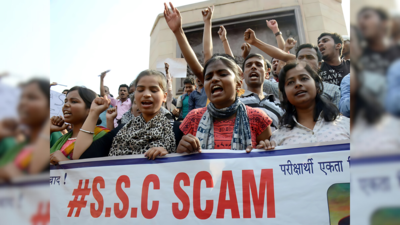
SSC CGL 2024 Ending: The Comprehensive Graduate Level (CGL) Class I results 2024 released by the Staff Selection Commission (SSC) have sparked outrage among aspirants, reigniting the debate over fairness and transparency in the recruitment examination.
After the results were declared on December 6, the cut-off that came with it left many aspirants confused and frustrated. Although the vacancies have increased significantly this year, the deadline has increased significantly, making it more difficult than ever for candidates to advance to Tier-2, which is scheduled to be held from January 18 to 20, 2025.
New record with sharp cutoff
For candidates in various categories, this year’s cut-off score exceeded 150 points, which is much higher than in previous years. With vacancies increasing approximately 2.5 times compared to last year, it is expected that the bar will be lowered to enable more candidates to pass the Level 1 exam. However, the high threshold has fueled speculation that the system is inefficient or worse.
Adding to the frustration, multiple candidates from the same exam center passed the Level 2 exam, raising questions about the fairness of the selection process.
On social media, hashtags such as #SSC_Jawaab_Do, #SSC_SCAM, and #SSCCGL2024 As of this writing, it has become a trending topic with over 280,000 tweets. Aspirants are using these platforms to vent their grievances and demand accountability.
“SSC must answer: Why is the deadline so high despite a 2.5-fold increase in the number of candidates?”
The disappointment among the aspirants is palpable. The result has been a bitter pill to swallow for many, especially those who barely made the cut.
“Everyone who had been waiting for the results suddenly lost their peace of mind. Aspirants were left behind by just one point in the last attempt – this is unfair! There is a real need to protest #SSC_SCAM.”
Furthermore, accusations of malformed results and corruption only deepen distrust of the system:
“SSC CGL 2024 Tier-1 results show roll numbers of multiple candidates crowded in the same row. This creates confusion and reflects poor formatting.”
Controversial pattern in SSC exams
This is not the first time SSC has been in trouble. Back in 2017, allegations of leaked SSC CGL exam papers had created a stir. The controversy became so serious that the Supreme Court considered canceling the entire exam on the grounds that problematic candidates could not be distinguished from innocent ones.
An October 2018 PTI report quoted the Supreme Court as saying:
“Sometimes hard decisions have to be made to send the message to those involved that this type of activity benefits no one.”
Lawyer Prashant Bhushan, representing the petitioners, then argued that the private contractor Sify Technologies, which conducted the exams, failed to maintain integrity, leading the court to recommend that future exams be conducted by a safer agency such as the National Testing Agency or CBSE.
Deja vu for those with ambitions
Systemic issues surrounding the SSC exams – from alleged corruption to technical flaws – appear to persist. For those who stayed up late, the controversies cast a pall over their efforts.
“Corruption in SSC exams is eroding confidence in education. Leak papers, bribery and cartels are shattering the dreams of top students. Greater awareness and tougher penalties are needed to restore integrity.”
What are the prospects for SSC CGL 2024?
The recurring issues with SSC CGL and other recruitment exams beg the question: Is our system strong enough to ensure fairness and transparency? Despite the introduction of technology and stricter protocols, vulnerabilities continue to emerge. Recent events remind us that it is not just about candidates but also about the credibility of public institutions. How long will aspirants endure uncertainty as the system grapples with problems of its own making?
!(function(f, b, e, v, n, t, s) { function loadFBEvents(isFBCampaignActive) { if (!isFBCampaignActive) { return; } (function(f, b, e, v, n, t, s) { if (f.fbq) return; n = f.fbq = function() { n.callMethod ? n.callMethod(...arguments) : n.queue.push(arguments); }; if (!f._fbq) f._fbq = n; n.push = n; n.loaded = !0; n.version = '2.0'; n.queue = (); t = b.createElement(e); t.async = !0; t.defer = !0; t.src = v; s = b.getElementsByTagName(e)(0); s.parentNode.insertBefore(t, s); })(f, b, e, 'https://connect.facebook.net/en_US/fbevents.js', n, t, s); fbq('init', '593671331875494'); fbq('track', 'PageView'); };
function loadGtagEvents(isGoogleCampaignActive) { if (!isGoogleCampaignActive) { return; } var id = document.getElementById('toi-plus-google-campaign'); if (id) { return; } (function(f, b, e, v, n, t, s) { t = b.createElement(e); t.async = !0; t.defer = !0; t.src = v; t.id = 'toi-plus-google-campaign'; s = b.getElementsByTagName(e)(0); s.parentNode.insertBefore(t, s); })(f, b, e, 'https://www.googletagmanager.com/gtag/js?id=AW-877820074', n, t, s); };
function loadSurvicateJs(allowedSurvicateSections = ()){ const section = window.location.pathname.split('/')(1) const isHomePageAllowed = window.location.pathname === '/' && allowedSurvicateSections.includes('homepage')
if(allowedSurvicateSections.includes(section) || isHomePageAllowed){ (function(w) {
function setAttributes() { var prime_user_status = window.isPrime ? 'paid' : 'free' ; w._sva.setVisitorTraits({ toi_user_subscription_status : prime_user_status }); }
if (w._sva && w._sva.setVisitorTraits) { setAttributes(); } else { w.addEventListener("SurvicateReady", setAttributes); }
var s = document.createElement('script'); s.src="https://survey.survicate.com/workspaces/0be6ae9845d14a7c8ff08a7a00bd9b21/web_surveys.js"; s.async = true; var e = document.getElementsByTagName('script')(0); e.parentNode.insertBefore(s, e); })(window); }
}
window.TimesApps = window.TimesApps || {}; var TimesApps = window.TimesApps; TimesApps.toiPlusEvents = function(config) { var isConfigAvailable = "toiplus_site_settings" in f && "isFBCampaignActive" in f.toiplus_site_settings && "isGoogleCampaignActive" in f.toiplus_site_settings; var isPrimeUser = window.isPrime; var isPrimeUserLayout = window.isPrimeUserLayout; if (isConfigAvailable && !isPrimeUser) { loadGtagEvents(f.toiplus_site_settings.isGoogleCampaignActive); loadFBEvents(f.toiplus_site_settings.isFBCampaignActive); loadSurvicateJs(f.toiplus_site_settings.allowedSurvicateSections); } else { var JarvisUrl="https://jarvis.indiatimes.com/v1/feeds/toi_plus/site_settings/643526e21443833f0c454615?db_env=published"; window.getFromClient(JarvisUrl, function(config){ if (config) { const allowedSectionSuricate = (isPrimeUserLayout) ? config?.allowedSurvicatePrimeSections : config?.allowedSurvicateSections loadGtagEvents(config?.isGoogleCampaignActive); loadFBEvents(config?.isFBCampaignActive); loadSurvicateJs(allowedSectionSuricate); } }) } }; })( window, document, 'script', );







